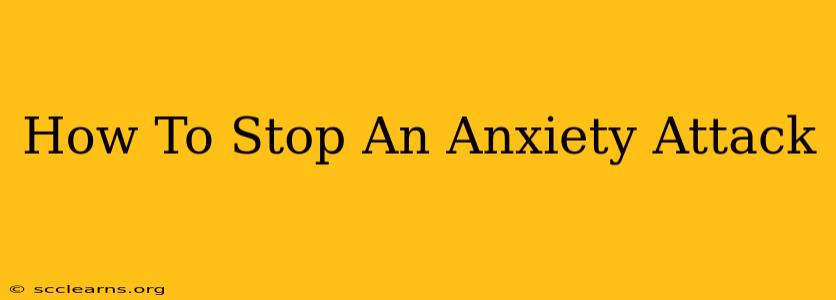Anxiety attacks can feel overwhelming, like a sudden storm hitting your calm. They're characterized by intense fear and discomfort, often accompanied by physical symptoms. But knowing how to stop an anxiety attack is crucial for managing your mental health. This guide provides practical techniques to help you navigate these challenging moments and regain control.
Understanding Anxiety Attacks
Before diving into solutions, it's essential to understand what's happening during an anxiety attack. Your body's "fight-or-flight" response is triggered, leading to a surge of adrenaline. This results in rapid heartbeat, shortness of breath, trembling, sweating, and dizziness. These symptoms, while frightening, are temporary. Recognizing this can be the first step towards calming yourself.
Common Symptoms of an Anxiety Attack:
- Rapid heartbeat (palpitations)
- Shortness of breath or hyperventilation
- Sweating
- Trembling or shaking
- Feeling of choking or shortness of breath
- Chest pain or discomfort
- Nausea or abdominal distress
- Dizziness or lightheadedness
- Chills or hot flashes
- Numbness or tingling sensations
- Fear of losing control or dying
- Feeling detached from oneself or one's surroundings (derealization or depersonalization)
Immediate Actions to Stop an Anxiety Attack
When an attack hits, immediate action is key. These techniques can help you manage the symptoms and regain a sense of calm:
1. Grounding Techniques:
Grounding techniques bring you back to the present moment, interrupting the cycle of anxious thoughts. Try these:
- 5-4-3-2-1 Method: Name 5 things you can see, 4 things you can touch, 3 things you can hear, 2 things you can smell, and 1 thing you can taste.
- Focus on your senses: Pay close attention to the textures of objects around you, the sounds you hear, and the smells in the air.
- Physical sensations: Focus on feeling your feet on the ground, the weight of your body in your chair, or the texture of your clothing.
2. Controlled Breathing:
Rapid breathing exacerbates anxiety. Slow, deep breaths can help regulate your nervous system.
- Box Breathing: Inhale slowly to the count of four, hold for four, exhale slowly for four, and hold again for four. Repeat.
- Diaphragmatic Breathing: Place one hand on your chest and the other on your stomach. Inhale deeply, allowing your stomach to rise, and exhale slowly, feeling your stomach fall.
3. Muscle Relaxation:
Physical tension often accompanies anxiety. Progressive muscle relaxation can help alleviate this.
- Tension and Release: Tense a muscle group (e.g., your shoulders) for a few seconds, then release the tension, noticing the difference. Repeat with different muscle groups.
4. Positive Self-Talk:
Negative thoughts fuel anxiety. Challenge these thoughts with positive affirmations. Remind yourself that this feeling is temporary and that you can manage it.
5. Seek a Safe Space:
Find a quiet, comfortable place where you can be alone and undisturbed. This could be a private room, a quiet corner, or even outdoors in nature.
Long-Term Strategies for Anxiety Management
While these immediate techniques help during an attack, long-term strategies are crucial for preventing future episodes.
1. Therapy:
Cognitive Behavioral Therapy (CBT) and other therapeutic approaches are highly effective in managing anxiety. A therapist can help you identify triggers, develop coping mechanisms, and change negative thought patterns.
2. Lifestyle Changes:
- Regular Exercise: Physical activity reduces stress hormones and improves mood.
- Healthy Diet: Nourishing your body with a balanced diet supports mental well-being.
- Sufficient Sleep: Aim for 7-9 hours of quality sleep per night.
- Mindfulness and Meditation: Regular practice can enhance self-awareness and reduce stress.
- Limit Caffeine and Alcohol: These substances can exacerbate anxiety symptoms.
3. Medication:
In some cases, medication may be necessary to manage anxiety. Consult with a doctor or psychiatrist to discuss appropriate options.
When to Seek Professional Help
While learning to manage anxiety attacks is empowering, it's essential to seek professional help if:
- Attacks are frequent and severe.
- Attacks interfere significantly with your daily life.
- You experience suicidal thoughts or feelings.
Remember: You are not alone. Many people experience anxiety attacks, and effective treatments are available. Taking proactive steps to manage your anxiety will significantly improve your quality of life. Don't hesitate to reach out for support when you need it.

